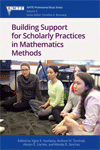
Building Support for Scholarly Practices in Mathematics Methods
Edited by:
Signe E. Kastberg, Purdue University
Andrew M. Tyminski, Clemson University
Alyson E. Lischka, Middle Tennessee State University
Wendy B. Sanchez, Kennesaw State University
A volume in the series: The Association of Mathematics Teacher Educators (AMTE) Professional Book Series. Editor(s): Babette M. Benken, California State University, Long Beach.
Published 2017
Building Support for Scholarly Practices in Mathematics Methods is the product of collaborations among over 40 mathematics teacher educators (MTEs) who teach mathematics methods courses for prospective PreK‐12 teachers in many different institutional contexts and structures. Each chapter unpacks ways in which MTEs use theoretical perspectives to inform their construction of goals, activities designed to address those goals, facilitation of activities, and ways in which MTEs make sense of experiences prospective teachers have as a result. The book is organized in seven sections that highlight how the theoretical perspective of the instructor impacts scholarly inquiry and practice. The final section provides insight as we look backward to reflect, and forward with excitement, moving with the strength of the variation we found in our stories and the feeling of solidarity that results in our understandings of purposes for and insight into teaching mathematics methods. This book can serve as a resource for MTEs as they discuss and construct scholarly practices and as they undertake scholarly inquiry as a means to systematically examine their practice.
CONTENTS
Foreword, Christine D. Thomas. Preface, Signe E. Kastberg, Andrew M. Tyminski, Alyson E. Lischka, and Wendy B. Sanchez. SECTION I: PERSPECTIVES AND MATHEMATICS METHODS COURSES. Setting the Stage: Explorations of Mathematics Teacher Educator Practices, Signe E. Kastberg, Andrew M. Tyminski, Alyson E. Lischka, and Wendy B. Sanchez. Political Conocimiento for Teaching Mathematics: Why Teachers Need It and How to Develop It, Rochelle Gutiérrez. Challenges in Mathematics Teacher Education from a (Mostly) Constructivist Perspective, Martin A. Simon. Teaching a Mathematics Methods Course: Understanding Learning From a Situative Perspective, Elham Kazemi. SECTION II: USING PERSPECTIVES TO INFORM SCHOLARLY INQUIRY AND PRACTICE. Using the Knowledge Quartet to Support Prospective Teacher Development During Methods Coursework, Tracy L. Weston. Three Learning Perspectives for Translating Curriculum Into Instruction, Darrell Earnest and Julie M. Amador. Diverse Perspectives on Sociopolitical Framings for Mathematics Methods, Frances K. Harper, Beth Herbel‐Eisenmann, and Andrea McCloskey. SECTION III: LEARNING GOALS AND ACTIVITIES IN MATHEMATICS METHODS COURSES. Experiences Using Clinical Interviews in Mathematics Methods Courses to Empower Prospective Teachers: A Conversation Among Three Critical Mathematics Educators, Theodore Chao, Jessica Hale, and Stephanie Behm Cross. Situating Learning for Secondary Mathematics Prospective Teachers Within the Context of Rehearsals: Challenges and Resulting Adaptations, Fran Arbaugh, Robert Wieman, Anne E. Adams, Dawn Teuscher, and Laura R. Van Zoest. Rehearsing for the Politics of Teaching Mathematics, Rochelle Gutiérrez, Juan Manuel Gerardo, and Gabriela E. Vargas. Activities and a Cognitive Pedagogy for Fostering Prospective Teachers’ Concept‐Development Practices in Mathematics Methods Courses, Barbara Kinach, Stephen Bismarck, and Wesam Salem. SECTION IV: ACTIVITY DEVELOPMENT. An Illustration of Scholarly Inquiry from the Cognitive Perspective: The Development of an Integer Activity for Prospective Elementary or Middle School Teachers, Nicole M. Wessman‐Enzinger and Wesam Salem. Enhancing Activities in Mathematics Methods Courses to Achieve Sociopolitical Goals, Brian R. Lawler, Raymond LaRochelle, and Angela Thompson. Shifting Focus: Exploring the Evolution of the Learner Analysis, Jennifer Ward. SECTION V: ACTIVITIES AND IMPLEMENTATIONS. Bringing Mathematics Methods Into Classrooms, Rajeev Virmani, Megan W. Taylor, and Chepina Rumsey Co‐authoring with: Tabatha Box, Elham Kazemi, Melinda Knapp, Sararose Lynch, Catherine Schwartz, Barbara Swartz, Tracy Weston, Dawn Woods. Prospective Teachers Analyzing Transcripts of Teaching, Laura M. Singletary, Zandra de Araujo, and AnnaMarie Conner. Doing Mathematics Across Languages: Exploring Possibilities for Supporting Emergent Bilinguals’ Mathematical Communication and Engagement, Frances K. Harper, Wendy B. Sanchez, and Beth Herbel‐Eisenmann. Using Mathematics Autobiography Stories to Support Emerging Elementary Mathematics Teachers’ Sociopolitical Consciousness and Identity, Anne Marie Marshall and Theodore Chao. SECTION VI: LOOKING INWARD. Interpretations and Uses of Classroom Video in Teacher Education: Comparisons Across Three Perspectives, Stephanie Casey, Ryan Fox, and Alyson E. Lischka. Theoretical Perspectives, Goals, and Activities for Secondary Mathematics Education Methods Courses, Ryan C. Smith, Cynthia E. Taylor, and Dongjo Shin. The “Mirror Test”: A Tool for Reflection on Our Sociopolitical Identities as Mathematics Teacher Educators, Andrea McCloskey, Brian R. Lawler, and Theodore Chao. SECTION VII: COMMENTARY. A Commentary With Urgency: Looking Across Theoretical Perspectives to Put Relationship Building with Underserved Students at the Forefront of Our Work, Richard Kitchen. About the Editors.
-
Paperback978-1-64113-025-7
Web price: $45.04 (Reg. 52.99)
-
Hardcover978-1-64113-026-4
Web price: $80.74 (Reg. 94.99)
- eBook978-1-64113-027-1

- MAT030000 - MATHEMATICS: Study & Teaching
- MAT027000 - MATHEMATICS: Research
- EDU029010 - EDUCATION: TEACHING METHODS & MATERIALS: Mathematics
-
 A Practical Guide to Exemplary Professional Development Schools
A Practical Guide to Exemplary Professional Development Schools
-
 Cases for Mathematics Teacher Educators
Facilitating Conversations about Inequities in Mathematics Classrooms
Cases for Mathematics Teacher Educators
Facilitating Conversations about Inequities in Mathematics Classrooms
-
 Diversity as Strategic Opportunity
Exploring New Paths to Good Administration
Diversity as Strategic Opportunity
Exploring New Paths to Good Administration
-
 Elementary Mathematics Specialists
Developing, Refining, and Examining Programs That Support Mathematics Teaching and Learning
Elementary Mathematics Specialists
Developing, Refining, and Examining Programs That Support Mathematics Teaching and Learning
-
 The AMTE Handbook of Mathematics Teacher Education
Reflection on Past, Present and Future – Paving the Way for the Future of Mathematics Teacher Education, Volume 5
The AMTE Handbook of Mathematics Teacher Education
Reflection on Past, Present and Future – Paving the Way for the Future of Mathematics Teacher Education, Volume 5
-
 The Mathematics Teacher Education Partnership
The Power of a Networked Improvement Community to Transform Secondary Mathematics Teacher Preparation
The Mathematics Teacher Education Partnership
The Power of a Networked Improvement Community to Transform Secondary Mathematics Teacher Preparation
-
 The Undivided Life
Faculty of Color Bringing Our Whole Selves to the Academy
The Undivided Life
Faculty of Color Bringing Our Whole Selves to the Academy

